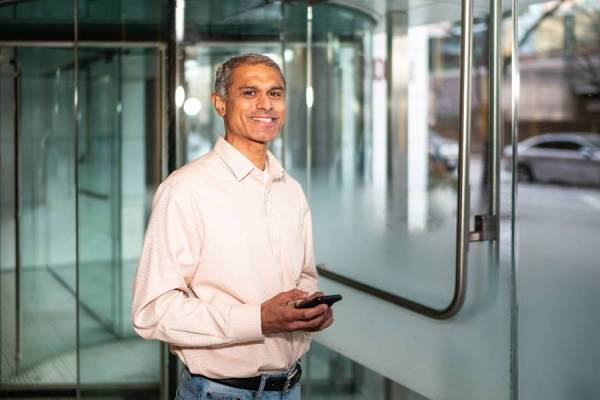
By Anand Parthasarathy
February 27, 2023: The Marconi Prize for 2023 has been awarded to India-born Hari Balakrishnan, Professor of Computer Science and Artificial Intelligence at the Massachusetts Institute of Technology (US).
The Prize announced annually by the Marconi Society and named after Italian wireless pioneer Guglielmo Marconi, is considered among the world’s topmost honours in the field of information and communication technology.
The Society cites “the broad impact to society of Prof Balakrishnan’s fundamental discoveries in wired and wireless networking, mobile sensing, and distributed systems.”
It adds: “By focusing his research on the application of technology to solve large societal problems, Balakrishnan’s work has made millions of people safer and has made the Internet and wireless communications more efficient and robust.”
Born in Nagpur and raised in Mumbai and Chennai, Balakrishnan is an alumnus of the Kendriya Vidyala at IIT Madras and obtained his BTech in computer science from the same institution in 1993.
He proceeded to the US where he was awarded a doctorate in computer science by the University of California at Berkeley in 1998.
He began his scientific career at MIT the same year and has worked there ever since.
Between 1999 and 2004, Balakrishnan led the development of Cricket, an indoor location system harnessing ultrasonic and radio signals to estimate distances.
Wireless and Mobility
He later co-developed a mobile sensing system, CarTel, by putting mobile sensors in vehicles to measure road and driving conditions. Using this data he extracted insights that helps drivers address phone distractions, risky speeding, hard braking etc. The work led to the creation of Cambridge Mobile Telematics (CMT) a platform for safe driving that reduces risk and automates road assistance in 25 countries.
(Illustration of CMT project here)
Prof Balakrishnan’s research in networking, says an MIT release, “has led to better communication protocols for mobile devices communicating over the Internet, such as the techniques he developed to understand and improve the performance of data transport over wireless networks.”
“He has made significant contributions to network congestion control, overlay and peer-to-peer networks, robust routing, and Internet architecture, developing methods that have found their way into several commercial products and network standards.”
Upon receiving the Marconi Prize this week, Prof Balakrishnan says: “I like to be among the first to open a new area, rather than be the last word in an area.”
He adds: “I want our world to be safer, more resilient, and more sustainable and am inspired by how people use applications and the network. This helps me think about new research directions in networked systems and ways in which they can help solve societal problems.”Prof Balakrishnan will receive the Marconi Prize at a function in Washington DC on October 27. Indians who have received the Prize include Space scientist-educationist Prof Yash Pal (1980), MIMO wireless standard inventor and Stanford University emeritus professor Arogyaswami Paulraj (2014) and former President, Bell Labs, Arun Netravali (2017).
Unique scientific family of PhDs
(Illustration here)
Prof Balakrishnan was earlier honoured with the Infosys Prize in 2020. He comes with a scientific lineage that is almost unique in India.
Both his parents are theoretical physicists of renown:
After obtaining his PhD in the US, his father, Dr V. Balakrishnan, served at the Tata Institute of Fundamental Research (TIFR),Mumbai and at the Atomic Energy department’s Kalpakkam centre, then taught at IIT Madras. Two his courses were among the most popular on the government’s SWAYAM online education channel, garnering over 2 million views.
His mother Dr Radha Balakrishnan chose to return to India after obtaining her doctorate in the US and is a retired professor from the Institute of Mathematical Sciences Chennai.
Prof Hari Balakrishnan’s sister Dr Hamsa Balakrishnan, a former NASA scientist, is also at MIT today, as Associate Head of the Aeronautics and Astronautics department.
This report has appeared in Swarajya